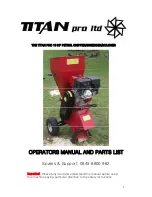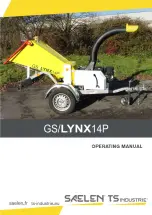
7
CH100
• When servicing the machine, place it on a level
surface and ensure that it cannot be moved.
• Observe the service intervals and annual safety
inspections.
• All spare parts and equipment must fulfill
the manufacturer’s requirements. This can be
guaranteed by using original parts.
• Put all safety devices back into place immediately
once servicing or maintenance is complete.
When lifting the machine,
check that the lifting/hoisting
equipment is in perfect working
order. Check the weight of the
machine before lifting it.
Choose lifting trajectories so that
they do not cause any danger.
Many countries have specific legislation on lifting,
hoisting cables and hoists. Always comply with local
safety regulations.
OILS AND LUBRICATION
• Always use the oil types recommended by the
manufacturer. Other types of oil may cause faults or
improper operation of the equipment, which could
lead to serious damage to people or property.
• Never mix different liquids or oils.
• Always follow the manufacturer’s lubrication
instructions.
• Use control equipment carefully until the
hydraulic oil has had time to reach its operating
temperature.
SAFETY INSTRUCTIONS FOR HYDRAULIC CIRCUITS
1. Work on hydraulic equipment may only be carried
out by professional hydraulic engineers.
2. Be cautious when using the equipment in cold
conditions.
3. Check the machine for leaks.
Do not use the machine if there is a leak from any
system. Check all hydraulic hoses – particularly
those which are bent during use – and replace any
that are in poor condition or have leaks. Ensure
that all joins are tight and that the lines are not
damaged. Check the hose sheathing for damage.
Check that all protective caps and filler caps are
closed properly.
4. Check that all hose connectors, lengths and
qualities comply with applicable requirements.
When replacing or repairing hoses, use original
parts or hoses and connectors recommended
by the manufacturer. Check particularly that the
pressure classes of the hoses and connectors are
suitable to the operating pressure levels.
5. Check that all safety devices such as pressure
relief valves, etc., are in place and work
properly. Familiarize yourself with their use.
Safety systems may never be bypassed.
6. Check the main hydraulic parts daily, and
always after a fault. Replace any damaged parts
immediately.
7. If a component is damaged,
clean it before repairing it.
Do not use solvents when cleaning parts.
8. Do not attempt to carry out repairs that you are
not fully familiar with.
9. Never carry out repairs of the hydraulic circuit
when the system is pressurized. When pressurized,
the oil spray can penetrate the skin and cause
mortal danger.
10. Never work below a device or component that is
only being held up by hydraulics. Use separate
supports when carrying our maintenance or
repairs. Do not disconnect cylinders or their valves
until the machine is well supported.
11. Most hydraulic oils do not evaporate easily.
Risk factors include hot oil, spills and oil mist
(pressurized).
12. If oil gets into your eyes, rinse with plenty of water
and contact a doctor.
13. Avoid prolonged or repeated contact with your
skin.
14. If sprays or contact with the skin cannot be avoided,
use protective gloves, goggles and clothing as
necessary. Do not use oily clothing.
15. Avoid discharging hydraulic oil into the
environment, as it can pollute waterways and the
groundwater. If biodegradable oil is to be used,
please contact the manufacturer beforehand and
have the suitability of your equipment for the
operation with biodegradable oil confirmed by
him before such oil is used.
16. Store the oil in sealed containers provided by the
manufacturer. Try to transfer the oil directly from
its container into the tank.
17. If the oil must be passed through other containers,
ensure that they are completely clean. Caps,
funnels, sieves and filling holes must also be clean.
18. Never store oil outdoors, as water could condense
in it.
19. Always dispose of oil in a suitable container, never
into the environment!
CAUTION!
!
Содержание CH100
Страница 1: ...English Wood chipper CH100 Operator s Manual 2017 ...
Страница 33: ...33 CH100 ...
Страница 34: ...34 CH100 CH100 CHIPPER ...
Страница 42: ...42 CH100 3 4 11 2 8 18 9 12 14 16 17 5 1 6 13 15 CH100 HYDRAULIC OPERATION ...
Страница 44: ...44 CH100 ...
Страница 46: ...46 CH100 ...
Страница 47: ...47 CH100 ...








































